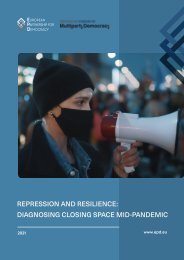Thinking Democratically: A Comprehensive Approach to Countering and Preventing Shrinking Space
You also want an ePaper? Increase the reach of your titles
YUMPU automatically turns print PDFs into web optimized ePapers that Google loves.
4. Global coordination <strong>and</strong> political leadership for the EU<br />
• The EU has the potential <strong>to</strong> be a leader on defending democratic space globally. The<br />
ability of the EU <strong>and</strong> EU Member States <strong>to</strong> harness this potential depends on their ability <strong>to</strong><br />
overcome internal divisions <strong>and</strong> adopt a joint problem assessment <strong>and</strong> strategy.<br />
• The EU <strong>and</strong> European states should build strategic partnerships with other international<br />
ac<strong>to</strong>rs with the political will <strong>to</strong> defend democratic space.<br />
• The EU’s efforts <strong>to</strong> strengthen European citizenship are intimately interlinked with the<br />
EU’s efforts <strong>to</strong> strengthen active citizenship in partner countries: both face similar<br />
challenges, <strong>and</strong> both require an enabling democratic environment with space for<br />
contestation. The EU should build those bridges <strong>and</strong> overcome the divide between internal<br />
<strong>and</strong> external action.<br />
IDEAS FOR ACTION<br />
- Create a new international mechanism that can be triggered by likeminded partners <strong>to</strong> convene<br />
emergency meetings upon sudden deteriorations in democratic space, as well as regular exchanges<br />
on gradual closing. This might require a pre-commitment <strong>to</strong> a shared underst<strong>and</strong>ing of democratic space<br />
<strong>and</strong> a common set of principles for an enabling environment.<br />
- Alternatively, repurpose existing international mechanisms or create an informal international<br />
coordination group of policy officers aimed at coordination <strong>and</strong> information exchange.<br />
- Share s<strong>to</strong>ries of successful attempts <strong>to</strong> counter closing space, both in public communication <strong>and</strong> in<br />
internal exchange platforms <strong>and</strong> workshops. Build on experience from civil society – inside <strong>and</strong> outside<br />
Europe – in bringing <strong>to</strong>gether a compendium of good practices <strong>and</strong> success s<strong>to</strong>ries.<br />
- Hold regular inter-service groups on closing space, <strong>to</strong> strengthen internal learning <strong>and</strong> coordination<br />
within <strong>and</strong> between different European Commission services, agencies <strong>and</strong> DGs. This will facilitate<br />
learning about closing space tactics across geographic regions <strong>and</strong> support the sharing of successful<br />
attempts <strong>to</strong> create space. After an initial trial period, consider exp<strong>and</strong>ing these groups <strong>to</strong> policy officers<br />
working on democratic space from EU member states.<br />
- The EU <strong>and</strong> EU member states need <strong>to</strong> jointly make the case for democracy more clearly <strong>and</strong><br />
persuasively in their public communication. Such a communication campaign would need <strong>to</strong> be<br />
sustained over time, consistently drawing from changing experiences <strong>and</strong> cross the artificial divide<br />
between EU internal <strong>and</strong> external action.<br />
51

















